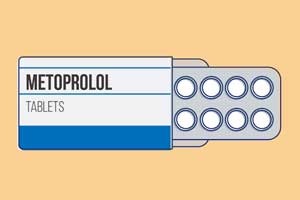- Home
- Editorial
- News
- Practice Guidelines
- Anesthesiology Guidelines
- Cancer Guidelines
- Cardiac Sciences Guidelines
- Critical Care Guidelines
- Dentistry Guidelines
- Dermatology Guidelines
- Diabetes and Endo Guidelines
- Diagnostics Guidelines
- ENT Guidelines
- Featured Practice Guidelines
- Gastroenterology Guidelines
- Geriatrics Guidelines
- Medicine Guidelines
- Nephrology Guidelines
- Neurosciences Guidelines
- Obs and Gynae Guidelines
- Ophthalmology Guidelines
- Orthopaedics Guidelines
- Paediatrics Guidelines
- Psychiatry Guidelines
- Pulmonology Guidelines
- Radiology Guidelines
- Surgery Guidelines
- Urology Guidelines
Metoprolol, as safe and effective as amlodipine in hypertension with OSA

Therapeutic effects of metoprolol, a beta-blocker, on lowering of blood pressure in hypertensive patients with obstructive sleep apnea (OSA) is similar to that of amlodipine, according to a new study published in the journal Sleep and Breathing. The findings further demonstrate that metoprolol could not decrease heart rate (HR) during the nighttime in such patients.
Yue Li, Cardiovascular Department, The First Affiliated Hospital, Harbin Medical University, Harbin, China, and colleagues conducted the study to compare the effects of metoprolol on BP lowering with amlodipine in hypertensive OSA patients.
Metoprolol (marketed under the trade name Lopressor) belong to the class of medications called selective β₁ receptor blocker. It works by slowing heart rate and relaxing blood vessels to decrease blood pressure and improve blood flow. However, its use for the management of hypertensive patients with OSA has been controversial for a long time.
For the study, the researchers assigned the hypertensive subjects with OSA to metoprolol and amlodipine groups. The two groups received 12 weeks of oral either metoprolol (47.5 mg once daily) or amlodipine (5 mg once daily) treatment. At baseline and after the 12-week treatment period, 24-h ambulatory blood pressure monitoring was performed in both groups.
Read Also: Popranolol superior to Metoprolol in electrical storm in ICD patients
Key Findings:
- Both of metoprolol and amlodipine treatments significantly lowered 24-h blood pressure (BP) (from 143/88 to 132.3/81.6 mmHg; from 141.3/84.5 to 133.7/80.8 mmHg), daytime BP (from 146/90.2 to 136.4/84.6 mmHg; from 145.1/87.6 to 138.2/84.1 mmHg), and nighttime BP (from 139.1/83.9 to 125.7/76.2 mmHg; from 134.5/78.5 to 125.8/74.1 mmHg).
- There were no significant differences between the groups in BP variability.
- metoprolol significantly reduced daytime heart rate, while 24-h and nighttime HR values had no remarkable changes compared with baseline.
"Metoprolol had similar therapeutic effects on BP lowering as amlodipine and could not decrease HR during the nighttime in hypertensive patients with OSA," concluded the authors.
For further reference log on to https://doi.org/10.1007/s11325-018-1688-5

Disclaimer: This site is primarily intended for healthcare professionals. Any content/information on this website does not replace the advice of medical and/or health professionals and should not be construed as medical/diagnostic advice/endorsement or prescription. Use of this site is subject to our terms of use, privacy policy, advertisement policy. © 2020 Minerva Medical Treatment Pvt Ltd